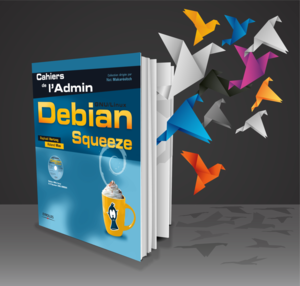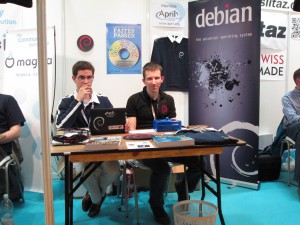 This is my monthly summary of my free software related activities. If you’re among the people who made a donation to support my work (106.39 €, thanks everybody!), then you can learn how I spent your money. Otherwise it’s just an interesting status update on my various projects.
This is my monthly summary of my free software related activities. If you’re among the people who made a donation to support my work (106.39 €, thanks everybody!), then you can learn how I spent your money. Otherwise it’s just an interesting status update on my various projects.
Debian France
I handled some subscriptions that we collected during Solutions Linux at the end of last month and I also worked on updating the accounts in preparation of our annual general assembly. As the current president, I wrote a “moral assessment” of the organization and I helped Sylvestre Ledru (the treasurer) to prepare an overview of our financial situation (which is rather good).
The plan for this general assembly included the renewal of 6 of our 9 board members so I tried to motivate some persons to candidate and I’m pretty happy to see that we managed to have 9 candidates for 6 seats, a real election for once. 🙂
And as usual, I updated Galette to version 0.7.4.2 and I filed a couple of tickets (#621, #622).
Debian Package Tracking System
We’re getting close to one month of work on the Google Summer of Code Project that rewrites the Package Tracking System. On average I spent a good 1h30 per day on reviewing the code, giving my feedback, and preparing the user stories for the next iteration, plus a 2 hour meeting each Wednesday afternoon. This is more than I expected but at I’m rather happy with the result so far.
We have a live test instance updated each week (after the end of the iteration) at pts.debian.net. The web interface is empty because the bulk of the work has been spent on the email interface for now, but it’s now feature complete and already has seen some improvements compared to the current implementation (fixing #340863 for example). You can interact with it by sending mails to control@pts.debian.net.
The Debian Administrator’s Handbook
The fundraising for the liberation of the original book in French met its initial target very quickly and we added new targets with supplementary rewards (more ebook from Eyrolles, donation to Debian). All the supplementary targets were met, although the last one took until the last day!
Thanks to all the supporters, we now have a French translation of the Debian Administrator’s Handbook which is free and we have collected about 2700 EUR for Debian.
Debian Packaging
I got a couple of release critical bug reports that I had to fix:
- #713636: cpputest FTBFS due to -Werror. Dropped -Werror in Debian and submitted the patch upstream.
- #713527: logidee-tools FTBFS due to reorganizations in the TeXLive meta-packages. Fixed the (build-)dependencies.
- #713947: multiple security issues in WordPress. Packaged new upstream version 3.5.2 into unstable and wheezy-security (and Yves-Alexis Perez took care of squeeze-security).
And trying to anticipate future issues, I filed an upstream ticket on feed2omb (#33) to see whether upstream had plans to support the new pump.io API that identi.ca is supposed to use soonish.
Kali Linux
I filed a couple of Debian bugs: #711866 to request a new upstream version of w3af in Debian, #711044 to report a missing dependency in LSB meta-informations of the vsftpd init script.
I worked on packaging passing-the-hash. Basically this is a fork of several software just to override some NTLM authentication functions. In some cases, I managed to avoid the fork by transforming the patches in LD_PRELOAD libraries that override the specific symbol of the patched functions.
Among the forked software, there was winexe which wasn’t packaged yet. So I packaged it but we quickly ran into some segfaults (which was already reported to upstream since a few months). I investigated the problem and prepared a patch. It has been submitted to upstream and merged.
Thanks
See you next month for a new summary of my activities.


